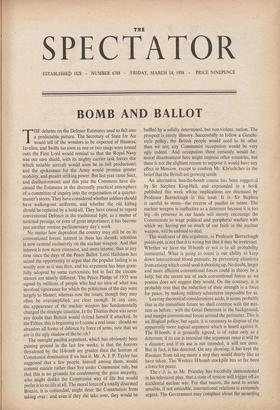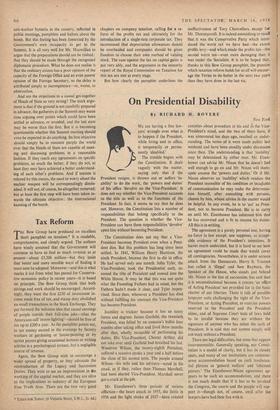BOMB AND BALLOT
THE debates on the Defence Estimates used to fall into a predictable pattern. The Secretary of State for Air would tell of the wonders. to be expected of Hunters, Javelins, and Swifts (as soon as one or two snags were ironed out); the First Lord would remind us that the Royal Navy was our sure shield, with its mighty carrier task forces (for which suitable aircraft would soon be in full production); and the spokesman for the Army would promise greater mobility, and greater striking power. But last year came Suez, and disillusionment; and this year the Commons have dis- cussed the Estimates in the discreetly practical atmosphere of a committee of inquiry into the organisation of a quarter- master's stores. They have considered whether soldiers should have walking-out uniforms, and whether the old kitbag should be replaced by a hold-all. They have ceased to regard conventional Defence in the traditional light, as a matter of national prestige, or even of great importance; it has become just another routine parliamentary day's work.
No matter how dependent the country may still be on its conventional forces, interest in them has shrunk; attention is now centred exclusively on the nuclear weapon. And that interest is now more extensive, and more intense, than at any time since the days of the Peace Ballot. Lord Hailsham has seized the opportunity to argue that the popular feeling is as Woolly now as it was then, and his argument has been grate- fully adopted by some cartoonists; but in fact the circum- stances are utterly different. The Peace Pledge of 1935 was signed by millions of people who had no idea of what was involved (ignorance for which the politicians of the day were largely to blame); whereas now the issues, though they may often be oversimplified, are clear enough. In any case, the appearance of the nuclear weapon has fundamentally changed the strategic situation. In the Thirties there was never any doubt that Britain would defend herself if attacked. In the Fifties, this is beginning to become a real issue : should we abandon all forms of defence by force of arms, now that we are in the ugly shadow of the bo:nb? .
The outright pacifist argument, which has obviously been- gaining ground in the last few weeks, is that the horrors threatened by the H-bomb are greater than the horrors of Communist domination if we ban it. Mr. A. J. P.'Taylor has suggested that a few people, himself among them, would commit suicide rather than live under Communist rule, but that this is no grounds for condemning the great majority, who might dislike the Communist way of life but would prefer it to no life at all. The moral force of a totally disarmed Britain, it is contended, might deter the Communists from taking over : and even if they did take over, they would be baffled by a solidly determined, but non-violent, nation. The prospect is surely illusory. Successfully to follow a Gandhi- style policy, the British people would need to be other than we are; any Communist occupation would be very ugly indeed. And occupation there certainly would be : moral disarmament here might impress other countries, but there is not the slightest reason to suppose it would have any effect in Moscow, except to confirm Mr. Khrushchev in the belief that the British are growing senile.
An alternative ban-the-bomb course has been suggested by Sir Stephen King-Hall, and expounded in a book published this week whose implications are discussed by Professor Barraclough in this issue. It is=-Sir Stephen is careful to stress—the reverse of pacifist in intent. The nuclear weapon is ineffective as a deterrent because it is too big—its presence in our hands will merely encourage the Communists to wage political and peripheral warfare with which we, having put so much of our faith in the nuclear weapon, will be unfitted to deal.
The weakness of this argtnnent, as Professor Barraclough points out, is not that it is wrong but that it may be irrelevant. Whether we have the H-bomb or not is in all probability immaterial. What is going to count is our ability to keep down international blood pressure, by preventing situations from arising which could send it shooting up, No doubt, larger and more efficient conventional forces could in theory be a help; but the recent use of such conventional forces as we possess does not suggest they would. On the contrary, it is probably true that the reduction of their strength is a force for peace, by making military adventures impossible for us.
Leaving theoretical considerations aside, it seems probable that in the immediate future we shall continue with the mix- ture as before : with the Great Deterrent in the background, and meagre conventional forces around the perimeter. This is an illogical policy; but again, it is necessary to dispose of the apparently more logical argument which is heard against it. The H-bomb, it is generally agreed, is of value only as a deterrent; if its use is intended (the argument runs) it will be a disaster; and if its use is not intended, it will not deter. But in fact, it has deterred. On any showing, it has kept the Russian!: from taking many a step they would dearly like to have taken. The Western H-bomb stockpile has so far been a force for peace.
The r= 1k is, as Mr. Priestley has forcefully demonstrated in his television play, that a state of tension will trigger off an accidental nuclear war. For that reason, the need to secure sensible, if not amicable, international relations is extremely urgent. The Government may complain about the mounting anti-nuclear hysteria in the country, reflected in public meetings, pamphlets and ballots about the bomb. But this feeling has been fomented by the Government's own incapacity to get to the Summit. It is all very well for Mr. Macmillan to argue that the preparations should not be rushed : that they should be made through the recognised diplomatic procedure. What he does not realise is that the ordinary citizen has a poor opinion of the capacity of the Foreign Office and an even poorer opinion of the Foreign Secretary, so the delay is attributed simply to incompetence—or, worse, to obstruction.
And are the objections to a casual get-together of Heads of State so very strong? The stock argu- ment is that if the ground is not carefully prepared in advance, the gatherers at the Summit may waste time arguing over points which could have been settled in advance, or avoided; and the last state may be worse than the first. But it is becoming questionable whether this Summit meeting should even be expected to do anything. Its first objective should simply be to reassure people the world over that the Heads of State are capable of meet- ing and discussing problems in a reasonable fashion. If they reach any agreements on specific problems, so much the better; if they do not, at least they may have achieved a better understand- ing of each other's problems. And if tension is relaxed by this means, the need to worry about the nuclear weapon will be correspondingly dimin- ished. It will not, of course, be altogether removed; but at least the first step will have been taken to- wards the ultimate objective : the international banning of the bomb.



































 Previous page
Previous page